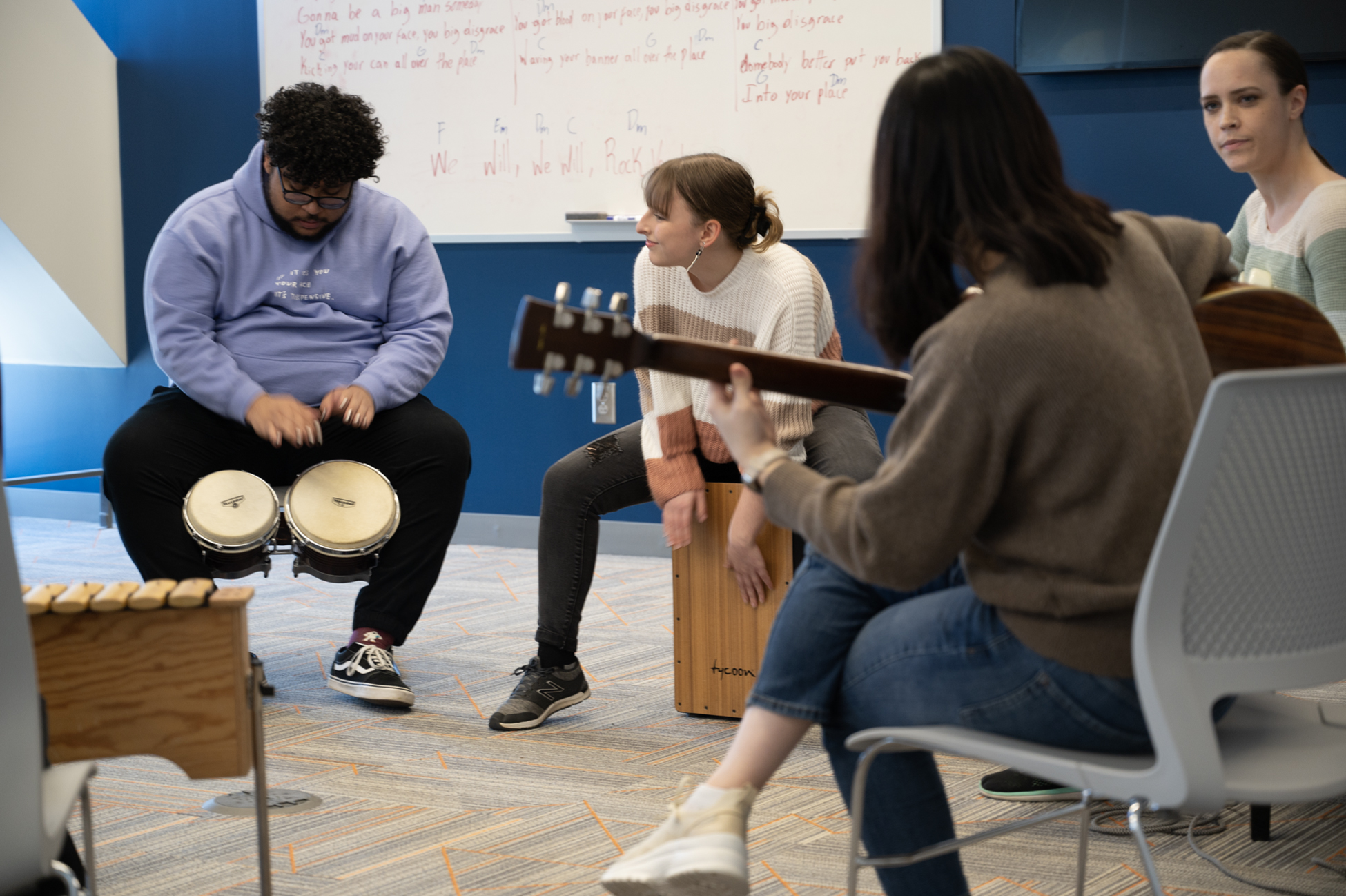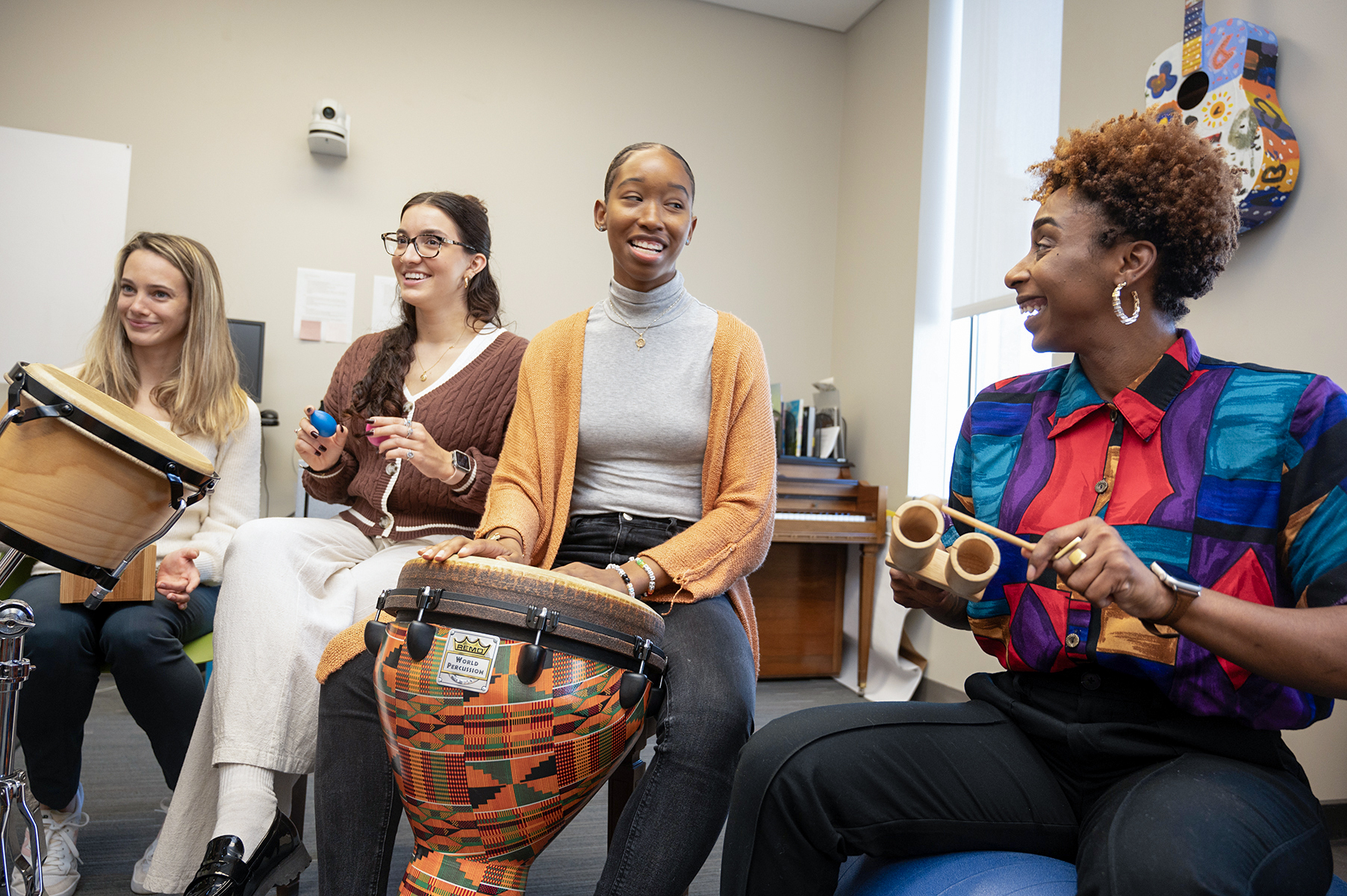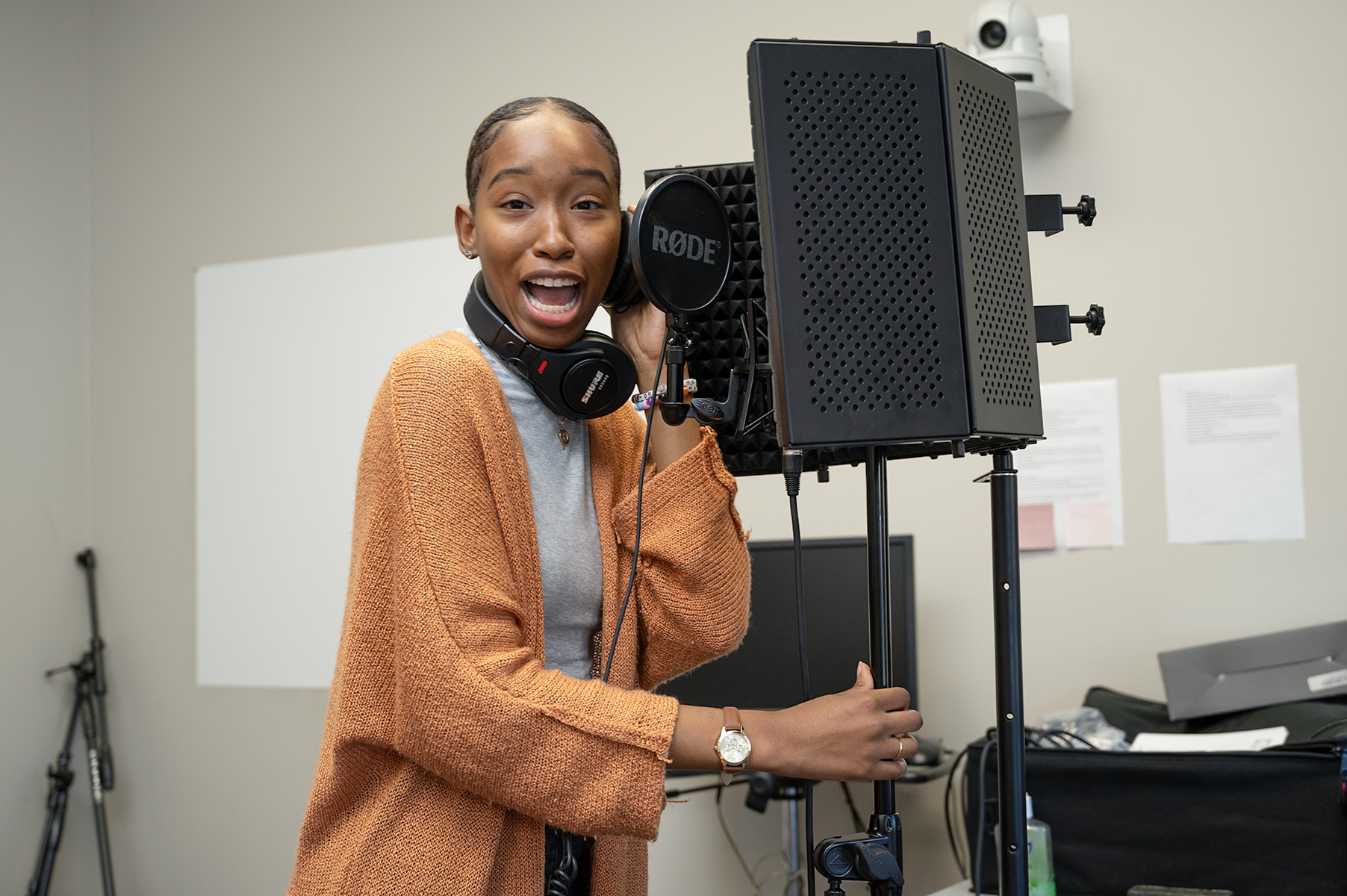Master of Arts in Music Therapy and Counseling at Drexel University

Launch a transformative career in music therapy and counseling with Drexel University's nationally recognized Master of Arts in Music Therapy and Counseling. This rigorous, 90-quarter-credit graduate program combines advanced coursework, immersive clinical training and potential research opportunities, preparing students to become board-certified music therapists and licensed professional counselors.
Why Choose Drexel?
- 100% job placement rate within one year of graduation
- 100% CBMT exam pass rate
- Integrated curriculum blending music therapy and counseling
- Located on a health sciences campus, offering unique interdisciplinary learning
- Strong emphasis on varied perspectives
- Opportunities for collaboration with students in art therapy and dance/movement therapy
Program Highlights
- Flexible Completion: Finish in as little as two years of full-time study, with options for decelerated plans.
- Clinical Experience: Gain hands-on training in diverse settings such as hospitals, schools, behavioral health centers, correctional facilities, community clinics and more.
- Faculty Expertise: Learn from experienced music therapists, counselors and creative arts therapy educators.
- Capstone or Thesis: Complete a culminating project tailored to your interests, supported by a multidisciplinary advisement team.
Career Preparation & Credentials
Graduates are eligible to:
- Sit for the Certification Board for Music Therapists (CBMT) exam to earn the MT-BC credential
- Meet Pennsylvania’s Licensed Associate Professional Counselor (LAPC) education requirements
(Note: Licensure requirements vary by state; students should verify requirements for their intended location.)
Who Should Apply?
This program is ideal for:
- Individuals with a Bachelor’s degree in another field seeking to become board-certified music therapists
- Practicing Bachelor’s-level music therapists pursuing advanced clinical and counseling education
Note: All courses are taught at the graduate level. Drexel does not offer an equivalency program.
What You’ll Learn
- Music therapy methods integrated with counseling and medical theories
- Clinical applications of improvisation, composition and imagery
- Group dynamics, clinical diagnosis, and psychotherapy theories
- Foundations of creative arts therapies
- Frameworks for engaging with people in promoting health and well-being
Unique Learning Environment
- Study within Drexel’s College of Nursing and Health Professions
- Engage with faculty and peers across the health sciences
- Train at affiliated facilities like the 11th Street Family Health Services and the Dornsife Center for Neighborhood Partnerships
Ready to take the next step?
Apply Now – Start your application today
Request Information – Get detailed program insights
Attend an Information Session – Meet faculty and learn more about the program
Compliance
The College of Nursing and Health Professions has a compliance process that may be required for every student. Some of these steps may take significant time to complete. Please plan accordingly. Each program and plan of study has specific compliance requirements. Students should wait to receive information about their program’s specific requirements before starting with the compliance process.
Visit the Compliance pages for more information.
Deadline:
Applications are reviewed in the two cycles based on the following dates:
- Early Deadline: January 15
- Regular Deadline: February 15
Please note that applications are reviewed on a rolling basis. We encourage you to submit completed applications by the early deadline for full interview and scholarship consideration. We will continue to review applications after the early deadline until the class is full or the date listed above, whichever should come first.
Admission Requirements
Degree:
Bachelor's degree in any field from an accredited institution, and a minimum overall GPA of 3.0 or above on all previous coursework.
Standardized Tests:
N/A
Transcripts:
- Official transcripts must be sent directly to Drexel from all the colleges/universities that you have attended. Transcripts must be submitted in a sealed envelope with the college/university seal over the flap to Drexel University, Application Processing, P.O. Box 34789, Philadelphia, PA 19101, or submitted through a secure electronic delivery service to enroll@drexel.edu. Please note that transcripts are required regardless of the number of credits taken or if the credits were transferred to another school. An admission decision may be delayed if you do not send transcripts from all colleges/universities attended.
- Transcripts must show course-by-course grades and degree conferrals. If your school does not notate degree conferrals on the official transcripts, you must provide copies of any graduate or degree certificates.
- If your school issues only one transcript for life, you are required to have a course-by-course evaluation completed by an approved transcript evaluation agency
- Use our Transcript Lookup Tool to assist you in contacting your previous institutions
Prerequisites:
Instrumental and vocal music experience is needed. All instrumental backgrounds are welcomed and will be considered for admissions. Applicants can have backgrounds in varied styles and genres with working knowledge in applied musical concepts. Volunteer or paid experience in a helping relationship is preferred.
References:
Three letters of recommendation are required. At least one recommendation should refer to your musicianship or musical skills. Letters of recommendation should be requested and submitted electronically through your online application.
Personal Statement/Essay:
Submit a 500-1250 word essay that focuses on your relationship with music, what led you to pursue a career path in music therapy and additional information that informs your application to this program. Essays may be submitted with your application or through the Discover Drexel portal after your online application is complete.
Music Portfolio:
Please submit the following audition videos through the Discover Drexel portal, which becomes available after submission of the completed online graduate application form.
For submission:
- Two pieces from different musical styles or genres that demonstrate proficiency on your primary instrument(s).
- Two popular, folk or original songs, sung while accompanying yourself on piano.
- Two popular, folk or original songs, sung while accompanying yourself on guitar.
CV/Resume:
Required. Include relevant education, work and service/volunteer experience.
Work and Volunteer Experience:
Social service work or volunteer history is highly valued.
Projected Tuition and Fee Rates:
These amounts are estimates and may vary across years and plans of study.
| AY 23/24 Tuition Rate |
$782 |
| AY 24/25 Tuition Rate |
$805 |
| Two Year Program |
| Quarter |
Fall |
Winter |
Spring |
Summer |
| CNHP Fees* First Year Only |
$1,265 |
$0 |
$0 |
$0 |
| Drexel Quarterly Fee** |
$280 |
$280 |
$280 |
$280 |
| Total Fees First Year |
$1,545 |
$280 |
$280 |
$280 |
| |
|
|
|
|
| Tuition Rate |
$829 |
$829 |
$829 |
$829 |
| Credits Per Quarter First Year |
14 |
12 |
15 |
11 |
| Tuition Per Quarter First Year |
$11,606 |
$9,948 |
$12,435 |
$9,119 |
| Total Cost First Year |
$13,151 |
$10,228 |
$12,715 |
$9,399 |
| |
|
|
First Year |
$45,493 |
| |
|
|
|
|
| Total Drexel Fees Second Year** |
$280 |
$280 |
$280 |
$280 |
| Tuition Rate |
$829 |
$829 |
$829 |
|
| Credits Per Quarter Second Year |
12 |
14 |
12 |
|
| Tuition Per Quarter Second Year |
$9,948 |
$11,606 |
$9,948 |
|
| Total Cost Second Year |
$10,228 |
$11,886 |
$10,228 |
|
| |
|
|
Second Year |
$32,342 |
| |
|
|
Credit Total |
90 |
| Total Cost |
|
|
|
$77,835 |
*Charged fall only
**Assuming full-time student
- Transcript Evaluation: All international students applying to a graduate program must have their transcripts evaluated by the approved agency: World Education Services (WES), 212.966.6311, Bowling Green Station, P.O. Box 5087, New York, NY 10274-5087, Web site: www.wes.org/.
- TOEFL: Applicants who have not received a degree in the United States are required to take the Test of English as a Foreign Language (TOEFL) or the International English Language Testing System (IELTS) An official score report must be sent directly to Drexel University Application Processing. The minimum TOEFL score is 90 and the minimum IELTS score is 6.5. For more information visit the Web site: www.ets.org, then click on TOEFL.
- I-20/DS-2019 and Supporting Financial Documents (international students only): After confirming attendance to Drexel, students will receive an email from ISSS with instructions for applying for their I-20/DS-2019 and submitting supporting financial documents.
International Consultants of Delaware, Inc.
P.O. Box 8629
Philadelphia, PA 19101-8629
215.222.8454, ext. 603
Commission on Graduates of Foreign Nursing Schools
3600 Market St., Suite 400
Philadelphia, PA 19104-2651
215.349.8767
World Education Services, Inc. (WES)
Bowling Green Station, P.O. Box 5087
New York, NY 10274-5087
212.966.631
Background checks:
As a student of the College of Nursing and Health Professions you will be required to satisfactorily complete a criminal background check, child and elder abuse checks, drug test, immunizations, physical exams, health history, and/or other types of screening before being permitted to begin clinical training.
You will not need to submit documentation of these requirements as part of your application to the master's program. Failure to fully satisfy these requirements as directed upon enrollment may prevent assignment to a clinical site for training. A background check that reflects a conviction of a felony or misdemeanor may affect your ability to be placed in certain facilities, and later, to become board certified and licensed.
Curriculum
The MA in Music Therapy & Counseling is a 90-quarter credit program. The program can be completed in a minimum of two years (seven quarters) of full-time study, although some students may take longer to complete all requirements, or opt for a decelerated plan of study. The majority of classes are taught in-person on Drexel's College of Nursing and Health Professions campus in Center City, Philadelphia with select classes offered online.
The coursework consists of both Music Therapy-specific and general mental health counseling coursework. Music Therapy-specific topics include:
- Music Therapy theories and methods for child, adolescent, adult and older adult populations
- Clinical musicianship and improvisation skills
- Social and cultural foundations in music therapy
- Technological applications
- Imagery methods
- Group dynamics in music therapy
- Theories of music psychotherapy
Mental health counseling coursework covers theories and skills in:
- Human psychological development
- Psychopathology and the Diagnostic and Statistical Manual of Mental Disorders
- Social and cultural foundations in counseling
- Behavioral research
- Group dynamics in counseling
- Theories of counseling and psychotherapy
- Career counseling
- Clinical appraisal and diagnosis
- Professional ethics
- Foundations of Creative Art Therapies
Clinical experience is integrated with classroom learning, with students participating in two practicums and one internship throughout the course of the program. For more information on the clinical education component of the Music Therapy program, click on the "Clinical Practices" tab above.
A Culminating Project rounds out the curriculum. Second-or third-year students conduct a Culminating Project that integrates practice with theory and/or research. Under the guidance of their Culminating Project advisor, students design a project that explores aspects of both their respective Creative Arts Therapies discipline and counseling. Examples of Culminating Projects include development of a method, a community engagement project, research thesis or artistic project. Culminating Projects may be connected to a student's internship, but it is not a requirement. At the end of each academic year, students present their Culminating Projects to peers, faculty, friends and family at their respective program's Colloquium. Students are also encouraged to submit projects to regional and national conferences when applicable.
Clinical Practice

Students complete more than 1,200 hours of graduate clinical practicum and internship experiences under the supervision of a board-certified music therapist. Placements include pediatric and adult psychiatric and general hospitals, recovery and wellness programs, therapeutic day care, preschool intervention programs, rehabilitation settings, long-term care facilities, forensic settings, schools, and community music therapy programs.
Students begin their clinical experience as soon as they enter the program. The clinical education is enhanced by 3 to 3.5 hours of individual and group supervision per week.
First-year students gain practical and theoretical knowledge regarding a range of clinical populations across two placements assigned by the Director of Field Education. During practicum experiences supervised by on-site board-certified music therapists, students are guided through observation, assisting and co-leading of music therapy sessions in preparation for the second-year internship.
Clinical internship lasts the entire second year and offers an opportunity for students to mature and develop advanced skills with one or, in some cases, two populations. The internship is chosen by the student with assistance from the Director of Field Education and approved by the Music Therapy Program Director. The practicum and internship fulfill the clinical training requirements of the American Music Therapy Association.
Testimonials

Hometown: Piedmont, CA
Undergraduate: BA, Music (Minor in Educational Studies), Haverford College; MM, Voice Performance, Temple University
Current Employment: Music Therapist at Young Children's Center for the Arts, Philadelphia, PA
How did the MTC program help you discover and gain experience in your areas of interest?
I loved that I had clinical experience throughout my two years at Drexel. While other programs make you wait to start clinical work, Drexel allowed me to dive right in  and immediately start enhancing my education by seeing and participating in actual music therapy in the real world. As someone who was new to music therapy, this was incredibly valuable. Integrating clinical work and course work deepened my understanding of music therapy. I especially appreciated being able to find and choose my own internship my second year, allowing me to focus on working with children with developmental delays, Autism Spectrum Disorder, and other neurological diagnoses.
and immediately start enhancing my education by seeing and participating in actual music therapy in the real world. As someone who was new to music therapy, this was incredibly valuable. Integrating clinical work and course work deepened my understanding of music therapy. I especially appreciated being able to find and choose my own internship my second year, allowing me to focus on working with children with developmental delays, Autism Spectrum Disorder, and other neurological diagnoses.
How did your musical identity transform while you were in the Music Therapy program?
Coming from a career of being a professional singer and voice teacher, it was quite a shock to redefine myself as music therapist. I was a complete beginner at guitar and it was very humbling! I also had never improvised and was not as confident in my improvisational skills. By the end of the program, I grew to love playing the guitar and improvising.
What aspects of the curriculum were valuable in addressing issues of diversity, multicultural awareness, and social justice?
From our first day, we were introduced to instruments and musical styles from all over the world and different cultures. Musically, we explored a large variety of styles in a safe, nonjudgmental environment and our own personal music histories were valued as well. In our core curriculum courses, I appreciate the focus on diversity and multicultural awareness especially in terms of our role as therapists in such a diverse city like Philadelphia.
What guidance would you give students who are considering Drexel's MA in Music Therapy & Counseling?
Drexel's program is intense but in two years you will feel confident in your skills as a clinician, counselor, and musician. All of my classmates were able to find full time work almost immediately and that speaks to how prepared we all were entering the job market. As an older student returning to school to start a new career, I felt very respected and supported by the faculty and my peers. Another benefit of Drexel's program is the opportunity to take classes with Art Therapy and Dance Movement Therapy students, allowing me to gain a broader perspective of Creative Arts Therapies. I now have a greater sense of how the arts can be used in therapy and I also have a large network of peers from all three modalities.
Hometown: Brockport, NY
Undergraduate major and institution: Philosophy (with Business Studies minor) at SUNY Geneseo
Current Employment: Music Therapist at Children's Hospital of Philadelphia
Why did you choose Drexel's Music Therapy & Counseling program? I appreciated that Drexel would not require me to earn an undergraduate music degree, as I didn't have a particular interest in becoming an expert on a specific instrument. Instead, I was able to use my own past experiences (playing in bands with friends, music technology) to develop my model to my own strengths.
What guidance would you give students who are considering Drexel's MA in Music Therapy & Counseling?
Gain musical experiences, either by learning formal music theory or on the side of playing music by playing music in performing groups before you begin.
How did this program prepare you for a career as a music therapist? Through classwork and on-site experiences, I learned everything I needed to know to stand at the starting line of my own music therapy professional practice. I received huge amounts of support from respected experts in the field, and learned to initiate an ongoing learning process that continues to enrich my work today.
What has your professional experience been like? Extremely rewarding and marked by good fortune! I accepted a job at Children's Hospital of Philadelphia shortly after graduation, and I am now nearing my six-year anniversary. Every day I support patients and their families in playing out their thoughts, feelings and values through musical experiences during life-changing illnesses and hospitalizations. I think a lot about how to support everyone I meet from infant patients to their great-grandparents in the developmental challenges they face. This great honor is also a great responsibility, which I take very seriously.
What aspects of the curriculum were valuable in addressing issues of diversity, multicultural awareness, and social justice?
Our class content helped me understand how my (white, male, hetero cis-gendered) perspectives and values are not necessarily "the norm" for everyone, but rather just a single reference point out of so many across the city and the world. It showed me how community or other non-Western approaches can be more beneficial for the struggling person, than anything that fits my ideas of what's normal.